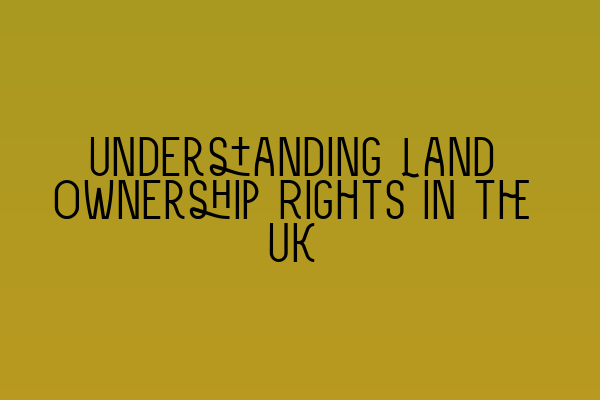Understanding Land Ownership Rights in the UK
As a solicitor, it is important to understand the complexities of land ownership rights in the UK. Whether you are a property developer, a landlord, or an individual looking to purchase a new home, having a comprehensive understanding of land ownership rights is crucial. In this blog post, we will explore the different types of land ownership, the rights and responsibilities associated with each, and the legal considerations that you should keep in mind.
Freehold Ownership
One of the most common and well-known forms of land ownership in the UK is freehold ownership. When you own a property on a freehold basis, you have complete ownership and control over the land and any buildings on it. This means that you are responsible for all maintenance, repairs, and management of the property. It also means that you have the right to sell, lease, or mortgage the property as you see fit.
Leasehold Ownership
Leasehold ownership is another form of land ownership that is quite common in the UK, especially in relation to flats and apartments. When you own a property on a leasehold basis, you have a fixed-term lease agreement with a freeholder who actually owns the land. Typically, leasehold agreements can last for several decades, but they can also be shorter or longer depending on the terms of the agreement.
As a leaseholder, you are granted certain rights and responsibilities. You have the right to live in and use the property, but you must adhere to the terms of the lease agreement. This may include paying ground rent, service charges, and obtaining consent for certain alterations or improvements. It is important to carefully review the lease agreement and seek legal advice if you have any questions or concerns.
Commonhold Ownership
In recent years, commonhold ownership has gained popularity as an alternative to leasehold ownership, especially for residential developments. Commonhold ownership allows individual owners of a property to also become members of a commonhold association, which collectively owns and manages the common areas and facilities of the development.
Under commonhold ownership, you have more control over your property and the shared spaces, as decision-making is done collectively by the members of the commonhold association. This form of ownership provides a greater sense of community and eliminates many of the uncertainties and issues associated with leasehold ownership. However, commonhold ownership is not as widely used as freehold or leasehold ownership and may be more difficult to find.
Legal Considerations
When buying or selling a property, whether it is freehold, leasehold, or commonhold, it is important to seek legal advice to ensure that your rights and interests are protected. A solicitor specializing in property law can help you navigate the complex legal landscape and carry out the necessary searches and checks to ensure that there are no hidden issues with the property.
Furthermore, it is imperative to have a clear understanding of the terms and conditions within your lease agreement, if applicable. This includes knowing your rights and responsibilities as a leaseholder and being aware of any restrictions or obligations that may be imposed by the freeholder.
Conclusion
Understanding land ownership rights in the UK is essential for anyone involved in property transactions, whether you are a buyer, seller, developer, or landlord. Whether you are considering a freehold, leasehold, or commonhold property, being aware of your rights and responsibilities will help you make informed decisions and protect your interests.
If you are preparing for the SQE exams and would like to enhance your knowledge of property law and land law, SQE Property Law & Land Law offers comprehensive preparation courses. Additionally, for SQE 1 practice exam questions and practice mocks, you can visit FQPS’ website.
To stay up to date with the latest news and developments in the legal field, including SRA SQE exam dates, be sure to follow our blog and stay connected.
Disclaimer: This blog post is for informational purposes only and should not be construed as legal advice. Always seek professional advice from a qualified solicitor for your specific situation.
